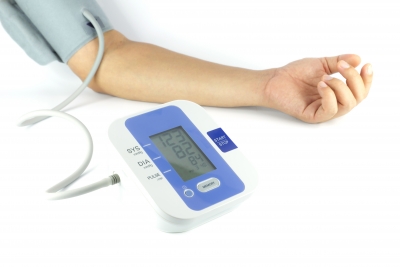Aggressively lower blood pressure to reduce heart disease risk 33%

One out of three U.S. adults, 33 percent, have high blood pressure. This equals around 70 million Americans.
About 65 percent over the age of 60 have high blood pressure.
High blood pressure increases your risk for heart disease and stroke. These are two leading causes of death in the U.S.
What is high blood pressure?
High blood pressure is defined as having a blood pressure at or above 140/90 mm Hg.
140 (top number) is your systolic reading.
90 (bottom number) is your diastolic reading.
Current guidelines for treating high blood pressure are to lower systolic blood pressure to below 140 mg Hg and below 130 mm Hg for adults with kidney disease or diabetes. The most commonly prescribed treatment is blood pressure medication, which can be effective, but includes potential side effects.
Would the benefits of lower blood pressure guidelines outweigh the cons associated with more aggressive treatment and higher medication dosage?
The Systolic Blood Pressure Intervention Trial (SPRINT) began in the fall of 2009, including 9300 participants 50 years of age or older. It is worth noting 28% of participants were over the age of 75. SPRINT is the first study to investigate the impact of maintaining a systolic blood pressure at a lower level than current guidelines and the impact on cardiovascular and kidney disease.
SPRINT investigators divided participants into two groups.
3 Tips to Naturally Lower Stress to Reduce Heart Disease Risk
 Stress is part of life. There’s no way you can avoid stress entirely. However, if you constantly live with high stress levels it can lead to physical problems. These physical problems may include high blood pressure, angina (i.e. chest pains), arrhythmia (i.e. irregular heart rate) and heart disease.
Stress is part of life. There’s no way you can avoid stress entirely. However, if you constantly live with high stress levels it can lead to physical problems. These physical problems may include high blood pressure, angina (i.e. chest pains), arrhythmia (i.e. irregular heart rate) and heart disease.
How Does Stress Increase Heart Disease Risk?
Stress can increase heart disease risk in different ways. First, stress affects you emotionally. This could lead you to make unhealthy food and lifestyle choices, such as overeating, not exercising, and smoking. Stress also causes elevated levels of the stress hormones adrenaline and cortisol, which may have a negative impact long term. Research is also finding that stress impacts the way blood clots.
What Can You Do to Reduce Stress?
Continue reading
Lower Blood Pressure with Cranberry Juice
 Typically cranberry juice is thought of as a home health remedy to treat urinary tract infections (UTI’s). Some recent research indicates cranberry juice may also promote lower blood pressure levels.
Typically cranberry juice is thought of as a home health remedy to treat urinary tract infections (UTI’s). Some recent research indicates cranberry juice may also promote lower blood pressure levels.
Let me begin by stating these study results are preliminary. More research needs to be conducted. The study, funded by Ocean Spray Cranberries, was published as an abstract and the results have not yet been peer-reviewed and published in a journal. Results were reported at a meeting of the American Heart Association in Washington, DC.
Placebo Controlled Study
Continue reading
Lower Heart Disease Risk While at Work
 Being active while you work can reduce your risk for heart disease just as much as exercising in your leisure time.
Being active while you work can reduce your risk for heart disease just as much as exercising in your leisure time.
A Finnish study of 60,000 men and women reports reduced heart failure risks when physical activity levels increased at work.



